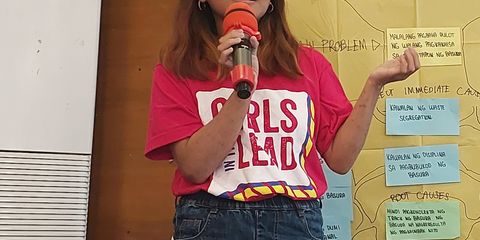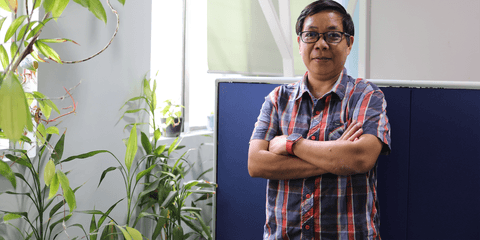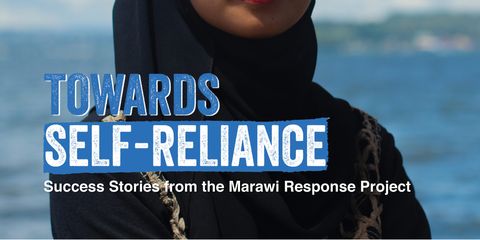Planting Seeds of Hope: How women are rebuilding their lives after Typhoon Odette
22 July 2022In the aftermath of Typhoon Odette (Typhoon Rai), women and children in Surigao del Norte became vulnerable to multiple health and safety risks. The Women-Friendly Spaces (WFS) initiative was launched to help protect their rights and address their needs in disaster and emergency settings.
On a Thursday morning in Tagana-an, Surigao del Norte, women from five different barangays flocked to an old two-story house for a session under the Women Friendly Space (WFS) program.
Ermelinda, a mother in her early sixties, is one of the women from the crowd. Despite feeling shy, Ermelinda was very welcoming and her smile showed an eagerness to share her experience.
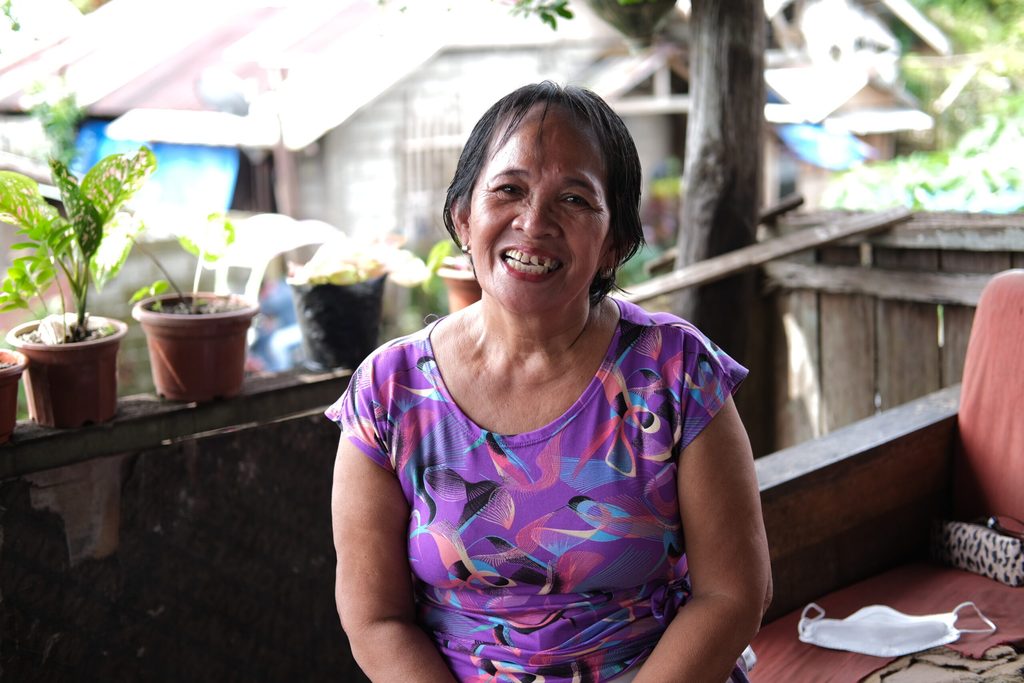
She is a mother of three who keeps herself busy with selling goods she’d purchase online. Two of her children continue to live and work in Metro Manila; while the other one lost their job and has since stayed with her and her husband. To support her small business, her child has been selling street foods by the road.
Before Typhoon Odette, they had a small plot of land with a hut and coconut trees which were unfortunately all washed out when the typhoon hit. Although business has been slow after the typhoon with their earnings sometimes only reaching 300 pesos, she said that their collective effort has helped them gradually recover.
South of Ermelinda’s home in the Dinagat Islands is Carmella’s home in the mainland which is surrounded by a vast expanse of rice fields and a view of faraway mountains. The rural landscape was a sight to behold until you notice the trees placed to the side of the road, looking as destroyed as the houses that barely survived the calamity
Like Ermelinda, Carmella, a sixty-two-year-old mother, also attends the Women Friendly Space Program.
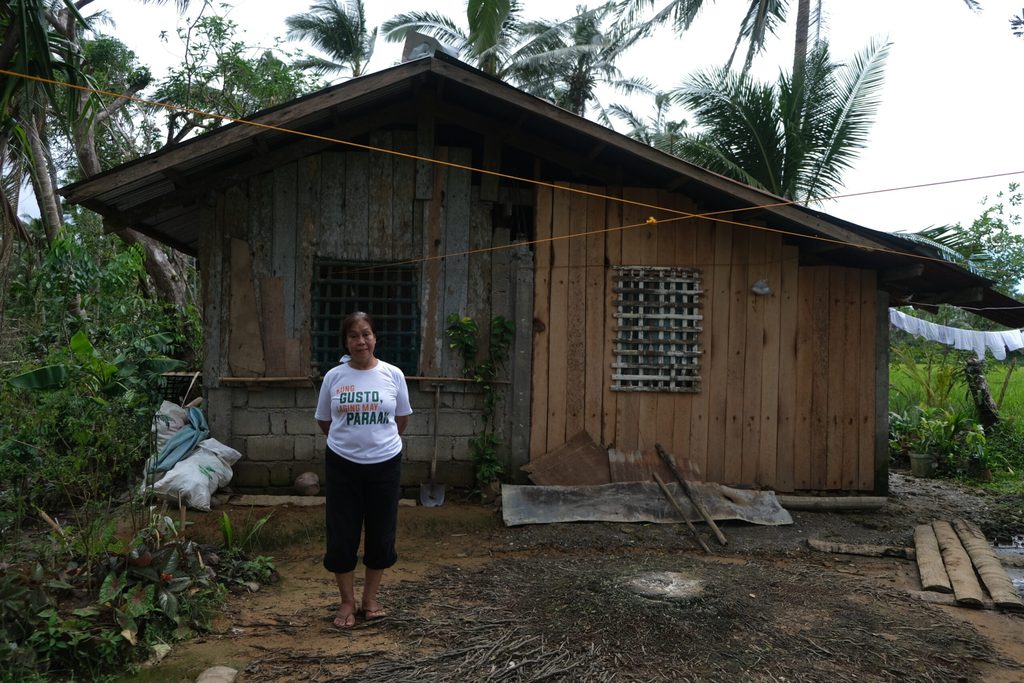
Typhoon Odette took her family by surprise. At the time, Carmella was with her husband and only one of her daughters. That afternoon, when the weather changed drastically and trees were already blown down, Carmella’s family remained calm. It was only until the skies went darker and torrents of rain poured down that they started to worry. The creek by their house was already overflowing, and the pliant coconut trees that used to surround their home bowed down to Typhoon Odette. Their house’s roof and walls were also destroyed.
“Mga 6:30 ng hapon, ayaw namin umalis kasi nga ang tubig napakalalim na. Eh, ang sabi ng anak ko kailangan na namin umalis.” (Around 6:30 in the afternoon, we didn’t want to evacuate as the flood was already deep. But my daughter said we had to leave the house.)
Despite their fear, the family walked hand in hand through the waist-deep waters. They walked through the flooded and muddy rice fields which made their journey even more difficult. When they reached the barangay hall and saw the crowd, they realized that they were the only people outside.
When they returned home after the typhoon, everything was in shambles. Like Ermelinda’s family, their home and crops were also destroyed, even their chickens died amid the typhoon. She worried about how they would rebuild their home and save what was left of their harvests. Carmella was at a loss for what to do, but she knew she had to stay strong for her children. As their family worked together to rebuild their home, they would run and get rations of food and relief goods. She said that the help they received uplifted their spirits.
“Pinakamasaya naming experience sa mga dumating na mga biyaya, ‘yung sa Plan. Kumpleto ‘yung bigay ng Plan. Kumpleto talaga as in gamit na gamit. Malaking bagay sa amin ‘yun. Hindi lang kami, pati ‘yung mga kabarangayan, Tuwang-tuwa sila! Lahat kami natuwa doon kasi kumpleto po. (The best help we received among all was the one from Plan. It was complete and we really used them. It was a big help for us. Even people from other barangays were happy! We were all happy because it had everything we needed.)
Aside from receiving help from Plan International, there are also people who give them water. Without any income, the water they receive is a huge help as the price of this necessity skyrocketed to 35 pesos a jar after the typhoon. The key to rebuilding, however, lies in their fields. “Pero ang pag-asa is ‘yung aming palay na hindi namin akalain na magbubunga pa ng ganyan.” (But our hope lies on our rice that we didn’t expect to grow.)
Carmella looked over to their rice fields, proud and happy. “Makikita n’yo rin na parang ‘andun lang talaga ang pag-asa. ‘Wag lang mawalan ng pag-asa. God is good all the time.” (You’ll also see that hope is just there. Just don’t lose hope. God is good all the time.)
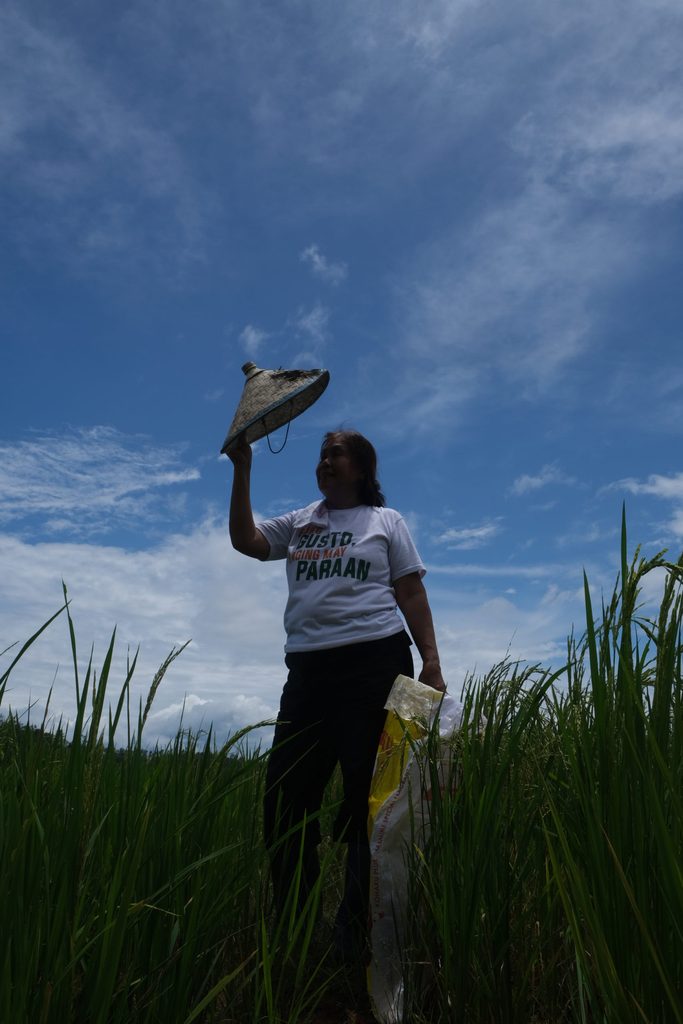
Just as their growing rice fields give Carmella hope, the Women Friendly Space program has planted seeds of courage and confidence among women like her and Ermelinda. The sessions have taught women in their communities about their rights and what they can do to recover from the typhoon and help their families.
Ermelinda said, “…ang laki laki ng naitulong. ‘Yung kahinaan ko, bigla akong lumakas… ganun pala, kahit babae, kayang-kaya tumulong sa mga kalalakihan.’” (It has been a great help. I was weak but got stronger. Even women are capable of helping men.)
Before attending the sessions, she always thought that the women’s place was only at home. However, she found that staying at home was both physically and mentally tiring “Nakakapagod ‘pag nakaupo ka lang sa bahay. Wala kang gagawin, mag-isip lang nang mag-isip. Lalo na ‘pag walang hanapbuhay, walang kinikita. Nakakapagod. Mas maganda ‘yung may ganitong samahan. Okay na okay po ako dito.” (It’s tiring when you’re just at home. You do nothing but worry, especially if you have no work, you have no money. It’s great that we have this group. I feel very good here.)
Similarly, Carmella reflects on how happy she is that times have changed, and that mothers no longer just stay at home while fathers decide for the rest of the family. Now, women can also make decisions for themselves “Sa ngayon, nangyayari na ‘yung kaya n’ya, kaya ko rin. Kaya din ng mga babae.” (Now, we see that if someone can do this, I can do it, too. Women can do it, too.) Their lectures have given the women in their community the confidence and encouragement they needed to challenge their old beliefs.
Because of the women who participate in Women Friendly Space, we have new hopes and new ideas
Carmella, WFS participant from Dinagat Islands
She shares that what resonated with her is the realization that women can also financially contribute to the household. “‘Yung kaya ng lalaking kumita, kaya ko rin! Nakakatulong sa pamilya. Hindi pwedeng sumandal sa kanya palagi. Kailangan ng tulong ng asawa para dumoble ang kita, para mas nakakahinga.” (If a man can earn money, I can, too! It helps the whole family. We can’t just rely on men all the time. We have to help our spouses so we can double the income and live comfortably.)
For Ermelinda, her favorite lesson was on how women have the right to refuse their husbands and call for help when they are forced and abused. “Dati, kapag mayroong mga abuses na naranasan ko, minsan ‘yung sisigawan ako. Yun bang may time talaga na di magkasundo, sa mga kapatid ko lang ako nagsusumbong. Ngayon, alam ko na kung saan ako pupunta kapag may abuses, kapag may mga karapatan akong nilabag ng kapwa ko–pwedeng sa barangay… pwede ring lumapit sa MSWD para magsumbong.” (Before, when I would experience certain abuses, like being yelled at or at times when there’s disagreement, I only reached out to my siblings. Now, I know my rights and where I can ask for help when my rights are violated—I can go to the barangay or MSWD.)
Aside from the lectures, Both Carmella and Ermelinda have found new friends through WFS, and they are thankful for the program for giving them a space to bond and help them forget about their troubles. Ermelinda shared that the workouts are one of her favorite parts of their sessions because they energize them. They would always end their lectures happily before heading off to eat snacks with the friends they’ve made in the community.
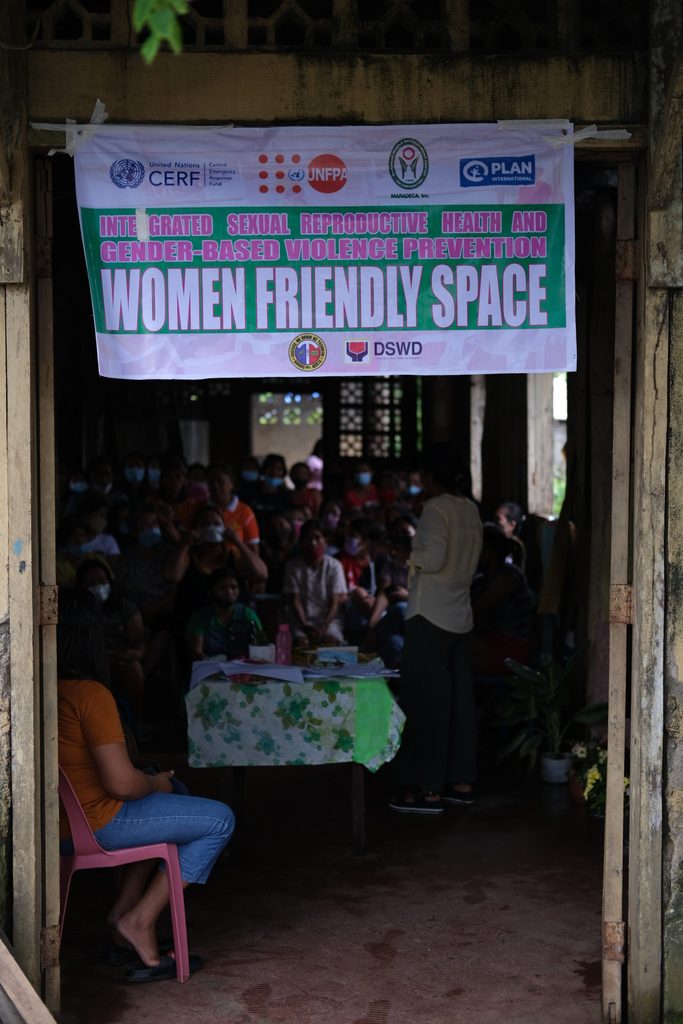
The WFS communities have become a safe space for many women where they can freely share their stories, reach out, and find sympathy. Through the program, the women of Surigao del Norte have learned more about their rights and more importantly, become more empowered to face life’s challenges.
Carmella shares, “Dahil sa mga kababaihang sumasali ng Women Friendly Space, mayroong mga bagong pag-asa at mga ideya kaming nakukuha. Kayang lumaban, kayang tumatag, kayang tumayo sa mga desisyon. Malaking bagay po ‘yun. Nagpapalakas ng kalooban.” (Because of the women who participate in Women Friendly Space, we have new hopes and new ideas. We can fight. We can endure. We can stand firmly on our decisions. It’s a big deal for us. It gives us strength.)
The Women-Friendly Spaces initiative is part of Plan International’s Emergency Response to areas affected by Typhoon Odette, made possible with funding from the United Nations Central Emergency Fund (UN CERF) and UNFPA Philippines. The program is implemented in Surigao del Norte through partnership with MARADECA Inc.
